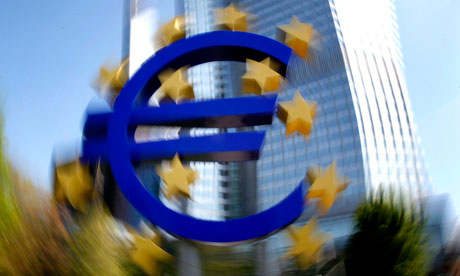As another meeting of euro area finance ministers ended in acrimonyFriday, the focus this week will turn to the resumption of — it is to be hoped — more constructive technical discussions between Greece and its European partners.
Yet the most potentially decisive discussions will be taking place in a different venue: Decision makers at the European Central Bank’s will hold their weekly consideration of how much “emergency liquidity” they should extend to Greek banks and on what terms.
At its weekly meeting, on April 29, the ECB will be under tremendous pressure to keep Greece on its life support system. But without progress elsewhere, this powerful monetary institution is at risk of joining other actors in the Greek drama that are unintentionally transitioning from being a major part of the solution to a big part of the problem now and in the future. This risk is symptomatic of the much larger dysfunctions undermining a comprehensive and sustainable outlook for Greece within the euro zone.
The ECB decision will involve some variant of three basic alternatives:
1. Pretend and extend. The ECB, through the Emergency Liquidity Assistance operated by its network of national central banks, would continue to extend exceptional funding to Greece. This would be done under the pretense that it is helping Greece deal with a liquidity problem instead of acknowledging the country’s true predicament, deep economic and solvency deficiencies. This approach has the advantage of keeping options open in the hope that Greece and its creditors will finally break through to decisive policy and financial solutions. The downside is that it would increase the ECB’s financial exposure to a problem case that, at least so far, has shown little chance of resolving itself in an orderly fashion. It would also raise concerns about burden-sharing as the ECB would act even as other creditors, not only from the private sector but also public institutions such as the International Monetary Fund, are scheduled to get repaid.
2. Pull the plug. Under this scenario, the ECB would be forthright. It would limit any further financing to Greece, raising not only the legitimate burden-sharing issues but also rightly noting that liquidity support would continue to prove ineffective without accompanying measures to improve growth and financial solvency. It would make further assistance conditional both on policy progress and new money to Greece from other sources, along with debt reduction. If such conditions failed to be met, the ECB decision would likely lead to even greater capital and deposit flight from Greece. And this, under most realistic scenarios, would prompt the Greek government to impose capital controls, default on payments and take even more draconian steps to gain control of any idle cash balances in the country. All of these developments would increase the risk of Greece exiting the euro zone.
3. Pull the plug as part of a comprehensive Plan B. In this case, the ECB’s refusal to extend additional liquidity support would be part of an attempt (albeit a risky one) at an orderly pivot for both the euro zone and Greece. The ECB would seek to minimize the risk of Greekcontagion and disorderly spillovers to other economies (such as Cyprus, Italy, Portugal and Spain) by expanding its funding windows for both governments and financial institutions. It would also step upits large-scale program of security purchases (known as quantitative easing). Meanwhile, work would proceed on some sort of interim European arrangement for Greece, including the possibility of an association agreement with the European Union or, even, remaining in the EU but outside the euro zone, like the U.K.
One of the big lessons of the last few years is that, regardless of the facts on the ground, no one — whether on the Greek side or among its official national, regional and international creditors — wishes to go down in history as the cause of the first exit from the single currency. For that reason, the ECB would most likely opt again for the first option — extending the ELA and pretending that a durable solution is around the corner — and it would hope that its involvement wouldn’t be overwhelmed by funding demands caused by accelerated deposit flight from Greek banks.
All this speaks to what is perhaps the greatest tragedy of all. For several years, very few people — whether in Greece, among its European partners or in the ECB, EU and IMF — have stepped up to the challenge of a lifetime: that of either taking decisive breakthrough policy actions or properly pressing the reset button. Instead, the decision has been to engage in a collective muddle-through, hoping some perfect — indeed, immaculate — solution would appear down the road.
Such a solution is hard to come by. And the wait for one is far from cost-free.
Millions of Greeks, including an alarming portion of the country’s youth, have become mired in devastating unemployment and spreading poverty. And with hundreds of millions of euros of debt obligations having been transferred from the private sector to European taxpayers, the would-be solvers of this Greek tragedy have become a growing part of the problem.



















